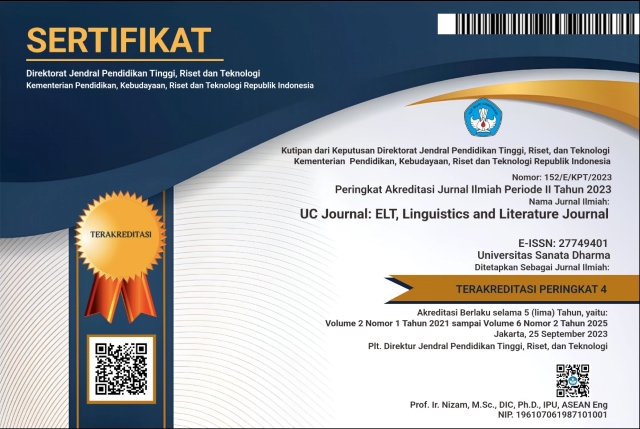INTERNAL AND EXTERNAL FACTORS INFLUENCING PRE-SERVICE TEACHERS IDENTITY CONSTRUCTION
(1) Sanata Dharma University
(*) Corresponding Author
Abstract
This paper explored internal and external factors that could influence pre-service English teacher in doing teaching in the classroom. The study aimed to investigate how pre-service teachers constructed their identity in order to prepare themselves to be teachers in true education field. However, it might help them to reflect themselves to be able to understand their identity as teacher candidates. Furthermore, interview would be conducted to get further and deep information from the participants and also to clarify their responses. Therefore, it encouraged the writer to conduct a qualitative study about pre-service English teacher identity.
Keywords
Full Text:
PDFReferences
Beijaard, D., Meijer, P. C., & Verloop, N. (2004). Reconsidering research on teachers professional identity. Teaching and Teacher Education, 20(2), 107-128.
Bloomfield, D. (2010). Emotions and getting by: A pre-service teacher navigating professional experience. Asia-Pacific Journal of Teacher Education, 38(3), 221-234.
Bullough, R. V. (1997). Practicing theory and theorizing practice. In J. Loughran, & T. Russell (Eds.), Purpose, passion and pedagogy in teacher education (pp. 13-31). London, UK: Falmer Press.
Chong, S. & Low, E. L. (2009). Why I want to teach and how I feel about teachingformation of teacher identity from pre-service to the beginning teacher phase. Educational Research for Policy and Practice, 8(1), 59.
Fang, Z. (1996). A review of research on teacher beliefs and practices. Educational Research, 38(1), 47-65.
Feiman-Nemser, S. F. (2001). Helping novices learn to teach: Lesson from an exemplary support teacher. Journal of Teacher Education, 52(1), 17-30.
Hong, J. Y. (2010). Pre-service and beginning teachers professional identity and its relation to dropping out of the profession. Teaching and Teacher Education 26(8), 1530-1543.
Kiziltepe, Z. (2008). Motivation and demotivation of university teachers. Teachers and Teaching, 14(5-6), 515-530.
Mullock, B. (2003). What makes a good teacher? The perceptions of postgraduate TESOL students. Prospect, 18(3).
ONeill, S. & Stephenson, J. (2012). Does classroom management coursework influence pre-service teachers perceived preparedness or confidence? Teaching and Teacher Education, 28(8), 1131-1143.
Papanastasiou, C. & Papanastasiou, E. (1997) Factors that influence students to become teachers. Educational Research and Evaluation: An International Journal on Theory and Practice, 3(4), 305-316. DOI: 10.1080/1380361970030402.
Tarman, B. (2012). Prospective teachers beliefs and perceptions about teaching as a profession. Educational Sciences: Theory and Practice, 12(3), 1964-1973.
Sandelowski, M. (2000). Focus on research methods-whatever happened to qualitative description? Research in Nursing and Health, 23(4), 334-340.
Sexton, D. M. (2008). Students teachers negotiating identity, roles, and agency. Teacher Education Quarterly, 35, 73-88.
Sumara, D. J. & Kapler, R. L. (1996). (Un) becoming a teacher: Negotiating identities while learning to teach. Canadian Journal of Education/Revue canadienne de l'ducation, 21(1), 65-83.
Walkington, J. (2005). Becoming a teacher: Encouraging development of teacher identity through reflective practice. Asia-Pacific Journal of Teacher Education, 33(1), 53-64.
Williams, J. & Ritter, J. K. (2010). Constructing new professional identities through self-study: From teacher to teacher educator. Professional Development in Education, 36,(1-2), 77-92.
DOI: https://doi.org/10.24071/uc.v1i1.2879
Refbacks
- There are currently no refbacks.
Copyright (c) 2020 Elisabeth Wulan Wahyuningtyas

This work is licensed under a Creative Commons Attribution-ShareAlike 4.0 International License.
UC Journal is indexed in:
UC Journal Sinta 4 Certificate (S4 = Level 4)
We would like to inform you that UC Journal: ELT, Linguistics and Literature Journal, or UC Journal has been nationally accredited Sinta 4 by the Ministry of Education, Culture, Research and Technology of the Republic of Indonesia based on the decree No. Surat Keputusan 152/E/KPT/2023. Validity for 5 years: Vol 2 No 1, 2021 till Vol 6 No 2, 2025
DOI: https://doi.org/10.24071/uc
e-ISSN (validity starting Vol 1, No 2, November 2020): 2774-9401

This work is licensed under CC BY-SA.
Creative Commons Attribution-ShareAlike 4.0 International License
 UC Journal: ELT, Linguistics and Literature Journal, a scientific peer-reviewed journal, was established in 20 May 2020 and is published twice a year, namely in May and November, by the English Language Education Study Programme (S1/Sarjana PBI) in collaboration with the English Education Master's Programme (S2/Magister PBI) of Sanata Dharma University, Yogyakarta, Indonesia.
UC Journal: ELT, Linguistics and Literature Journal, a scientific peer-reviewed journal, was established in 20 May 2020 and is published twice a year, namely in May and November, by the English Language Education Study Programme (S1/Sarjana PBI) in collaboration with the English Education Master's Programme (S2/Magister PBI) of Sanata Dharma University, Yogyakarta, Indonesia.














